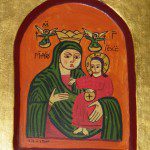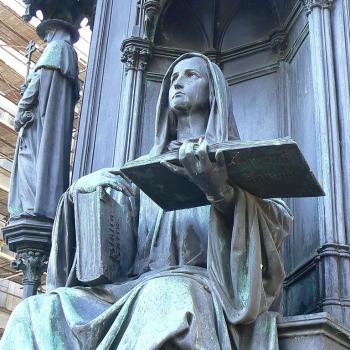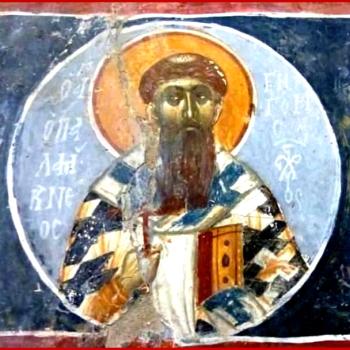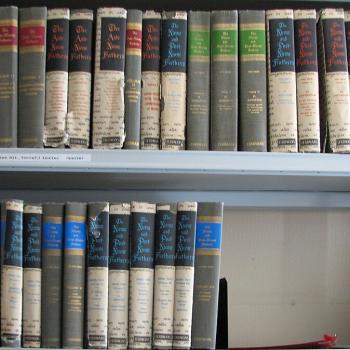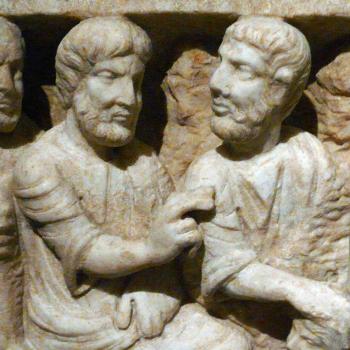
Photograph by Henry Karlson
In my previous post, I talked about how good followers of St. Thomas Aquinas should not feel confined to the letter of Aquinas’ writings, but rather, like Aquinas himself, put whatever was imperfect, the straw of conventions, to the fire, and emerge with the spirit that gives life, that is, to seek after the real core meaning of his teachings and not let the convention used to explain it get in the way of the truth[1]. What is true for Aquinas is not only true for Aquinas, but for all theology and theological exploration. The words employed in theological writings serve a purpose, they propose and point to a meaning which transcends the words used; once their meaning is understood, the words can be used or discarded, or radically modified, according to need. And if they get in the way of others understanding the truth, then it can be appropriate to discard the words, put the straw into the fire, without looking back.
This is an important way out of many theological controversies. We must recognize that behind the words used is a spirit, a teaching, a belief, which is agreed upon by all sides of an argument. Not all theological disagreements, of course, can be solved this way. Words do matter, and what they point to does matter – they do serve as a vehicle to a particular end, and if the ends differ, then it is not just a debate over words, and more needs to be done than “put the words to the flame.” But for many debates, where people are arguing with each other but pointing to the same truth or reality, then the words or conventions themselves do not need to be obstinately held on to, but let go so the unity can be found once again. Sadly, when one or both sides of a debate do not properly understand the conventions used by the other, instead of putting the words to the flame, their tempers flare up, and the debate soon lacks charity, and despite actual unity in belief, they split off from each other, with each side often reifying their own conventions as the end result. They become more concerned in proving and following the letter which they established, including the subtle distinctions which develop from it, than the truth originally meant by it.
A key example of this can be seen in the theological debates that the West and East have had over “created” and “uncreated” grace, with the West, following Aquinas, focusing on “created grace,” while the East, following St. Gregory Palamas, talk about “uncreated grace.” The conventions seem to suggest the theological views between the two traditions are in dispute, leading many in the West and the East fighting against each other, thinking there can be no unity between the two. And yet if the conventions were left out of it, that is, if they were put to the flames, and the meaning intended behind each convention was brought forth instead, the general agreement that lay behind the conventions could be found, and that could be the foundation for unity.
For St. Thomas, there are two considerations. First, grace comes from God and enters the soul, and as such, it is substantial in God as divine goodness but comes to the soul as an accident:
And because grace is above human nature, it cannot be a substance or a substantial form, but is an accidental form of the soul. Now what is substantially in God, becomes accidental in the soul participating the Divine goodness, as is clear in the case of knowledge. And thus because the soul participates in the Divine goodness imperfectly, the participation of the Divine goodness, which is grace, has its being in the soul in a less perfect way than the soul subsists in itself.[2]
Thus, St. Thomas Aquinas tells us, when looking at the way the soul interacts with grace, it is clear the soul can either cooperate with it, allowing its bounty to lead the soul from corruption to incorruption, or it can close itself off from grace, and find itself remaining defective from the corruption of sin. When grace encounters the soul, it can be seen, as it were, as a created effect:
And because to become and to be corrupted belong to what is, properly speaking, no accident comes into being or is corrupted, but is said to come into being and to be corrupted inasmuch as its subject begins or ceases to be in act with this accident. And thus grace is said to be created inasmuch as men are created with reference to it, i.e. are given a new being out of nothing, i.e. not from merits, according to Ephesians 2:10, “created in Jesus Christ in good works.”[3]
St. Gregory Palamas, on the other hand, discusses grace as being uncreated because God is uncreated, meaning he is eternal and unchanging and so his actions (energia) are eternal. Grace, as an activity of God, must be a part of the eternal, unchanging activity of God; as such it cannot be seen as created, for creation is predicated to that which is changeable. Moreover, connected to this theme, Palamas also points out that the activities of Go are linked to God himself, inseparable from his essence, so that where there is grace, there is God, which once again then suggests why grace has to be uncreated, for God is uncreated. From all of this, Palamas talks about how we relate to grace, allowing us to participate in the divine life through it, realizing, however, there remains a logical distinction between the energia of God with his essence:
Because both the divine essence and the divine energy are everywhere inseparably present, God’s energy is accessible also to us creatures; for, according to the theologians, it is indivisibly divided, whereas the divine nature, they say, remains totally undivided. Thus St John Chrysostom says, ‘A drop of grace filled all things with knowledge; through it miracles were wrought and sins forgiven.’ Here, while indicating that this drop of grace is uncreated, he hastens to make it clear that it is an energy of God but not His essence.[4]
Palamas, following his own understanding of the activity or energia of God as being uncreated, with grace being one such activity, therefore calls out those who talk about created grace, suggesting that such language is blasphemous (thereby establishing through such words, the conflict that continues in some circles between the West and the East). For Palamas, grace must always be seen as undivided from God. “All these things, then, are emanations and manifestations and powers and activities of that one divinity; they are with the divinity in a physical and inseparable fashion.”[5] The person of the Holy Spirit which dispenses such grace would then be created if grace is created, which is why Palamas claims such talk is blasphemous:
What are we to say, then, of course who regard the grace that dwells in God’s saints as created? Let them know that they blaspheme against the Spirit himself who, in giving His grace, is united to the saints.[6]
We see, therefore, St. Gregory Palamas was interested in grace, more as it relates to God and continues to be united with God, while St. Thomas Aquinas was interested in the subjective experience of said grace. Theologically, St. Thomas Aquinas, by calling such grace in God as the substantial good in God, he was always implying its proper, uncreated nature, that it reflects the goodness we find in God. But for St. Thomas, the interest and concern was for how grace is experienced in us, and as it is an experience which changes over time, as we cooperate with grace, then it is added to us and becomes, as it were, an action in time and therefore “created.” The grace as it is in God remains the same, the same eternal goodness of God, but our experience with the unchanging activity of God is in time, and so his actions seem to be creating new effects within the realm of becoming. The debate, therefore, is over conventions, which are not absolutes, and are similar to debates we find as to how Scripture and its conventions are to be interpreted. When God is said to repent in Scripture,[7] orthodox theological interpretations point out that it is only the appearance of a change of mind in God to those reacting to God’s actions in relation to creation: the one eternal act remains the same, but in the realm of becoming, it is experienced in relation to that becoming and not in accordance to God’s being. Thus, in being able to understand “repentance” or metanoia or change of mind in God in a conventional sense, in relation to our temporal changing experience of our relationship with God, so we can understand “created grace” as reflective of the way grace is experienced by us in time, and not as to what grace is by its nature.
The debate over grace therefore came, not out a difference in ultimate beliefs, but through the conventions used for such discussions. How and why those conventions were employed suggests an actual agreement between the sides. They agree that the one, uncreated nature of God and is of one uncreated and therefore eternal activity. But, the conventions became the means by which a lack of charity was to be played out, creating contention when it need not be there. St. Gregory Palamas certainly can be seen to have a share of the blame here, because he was more than a little hostile to the conventions used in the West. Thus, St. Gregory Palamas, like all great and holy theologians, has much to offer, but in his offering, the truth in it needs to be purified from what external straw used to explain it get in the way of the truth. His works needs the same purifying flame as Aquinas – we follow him in and with accordance to the intention and meaning of his words, without having to get caught in the externals, thinking one form of conventions alone is justified. His reading of the West was uncharitable, and such a lack, therefore, goes to the flames, allowing his work and contribution, which is great, to come out and useful for all. But this also means that the West also needs to do the same with Thomas and their tradition: recognize the truth contained in his words, and not focus on the words itself. They are the straw Aquinas was willing to toss to the flame.
And so, if both sides can and will do this, not just on the nature of grace, but on so many forms of dissention which keeps the West and East divided, the burning fire of love, God, can bring them back together as one. Let us pray that the day is soon to come!
[1] In this respect, theology itself can be seen a work which will be tried and tested; when it is founded upon the truth, the coarse letter will be put to the fire, and the truth will remain, as per 1 Cor. 3:11-15.
[2] St. Thomas Aquinas, Summa Theologica. trans. Fathers of the English Dominican Province (New York: Benziger Brothers, 1948), I-II.110.2.
[3] St. Thomas Aquinas, Summa Theologica, I-II.110.2.
[4] St. Gregory Palamas, “Topics of Natural and Theological Science and on the Moral and Ascetic Life: One Hundred and Fifty Texst,” in The Philokalia: Volume IV. trans. and ed. G.E. H. Palmer, Philip Sherrard, Kallistos Ware, et. al. (London: Faber and Faber, 1995),380.
[5] St. Gregory Palamas, Dialogue Between and Orthodox and a Barlaamite. trans. Rein Ferwerda (Binghamton, NY: Global Publications/CEMERS, 1999), 67. When reading this text here, it is clear we already have a convention which needs to be put to the flames, the notion that we can speak of God in a “physical” manner. Certainly the notion implied by it is understandable, but if we followed the convention to its proper end, it would lead to a notion of God which Palamas himself clearly rejects.
[6] St. Gregory Palamas, “To the Most Reverend Nun Xenia,” in The Philokalia: Volume IV. trans. and ed. G.E. H. Palmer, Philip Sherrard, Kallistos Ware, et. al. (London: Faber and Faber, 1995), 322
[7] See, for example, Gen. 6:6 and Ex. 32:14.
Stay in touch! Like A Little Bit of Nothing on Facebook:
A Little Bit of Nothing



